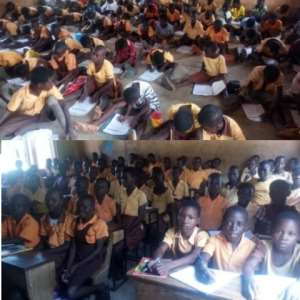
Ghana's educational system has recently come in for a lot of criticism, mostly because of the curriculum chaos and shortage of textbooks at both the basic and SHS levels. Since the new curriculum was introduced, it has been difficult to move forward with its implementation, and not even the minister has been overheard discussing it. For instance, it has been said that having the basic four students complete standardized assessments is pointless and time-consuming. The most recent sad development that calls into question the system is how a headteacher in the country's north swims the river Dakar to get to school and then teaches students in grades elementary through to six.
You might find it interesting to know that this narrative just represents a small portion of the difficulties rural schooling in Ghana currently faces. Rural communities in Ghana are underserved and trailing behind in the distribution of resources to improve education administration. Poor infrastructure, a lack of human resources, and teachers avoiding their postings are the main problems in rural education. The status quo has been maintained in some form or another since many educational policies do not aim to lessen these difficulties. Unfortunately, there are no clear-cut policies aimed at improving rural education and potential solutions to the challenge's complexity. As a result, this sends the incorrect message to stakeholders and other educational actors that rurally-educated youngsters are grossly marginalized since they are unable to reach certain standards and expectations because of the problems.
Ghana's rural communities are underfunded and underserved when it comes to the distribution of resources to improve education administration. Every kid has the right to a high-quality education, but if that right is being violated by pervasive problems, that child has been subjected to discrimination. Due to the numerous obstacles that face their education, millions of youngsters who attend school in rural areas have not been able to realize their full potential or fulfil any of their life goals. Children in villages may not have the same job potential as their counterparts in towns and cities because they do not view education as a means of advancing their careers. The dreadful situation is evident in many rural areas where youngsters only attend school for the sake of it rather than on purpose due to poverty. One can tell that these rural students who cannot afford three square meals a day may be studying from empty chalkboards or presumptions due to insufficient infrastructure, a shortage of textbooks for classes, and inexperienced teachers.
I have always believed that the National Teaching Council should prioritize awarding prizes to great rural teachers to encourage additional educators to work in these areas rather than rewarding educators in schools with ample resources. Again, the government must make every effort to provide decent housing in as many rural towns as it can. Naturally, the government can accomplish this with the help of the communities. To lessen the extent of unfair treatment meted out to rural students for no fault of their own, the government should embrace more policies aimed at enhancing rural education. The state must uphold the rights of all citizens, regardless of their size, shape, or colour, as the government is the duty-bearer.
Isaac Ofori
Educator/Unionist




 We’re disappointed over gov’t’s lacklustre attitude to negotiations of our condi...
We’re disappointed over gov’t’s lacklustre attitude to negotiations of our condi...
 No more Buffer Stock as Mahama promises to decentralise SHS food supply
No more Buffer Stock as Mahama promises to decentralise SHS food supply
 NSS urges President Akufo-Addo to sign National Service Bill into law
NSS urges President Akufo-Addo to sign National Service Bill into law
 You're lying, your 7-11pm dumsor attributed to overloaded transformers is false ...
You're lying, your 7-11pm dumsor attributed to overloaded transformers is false ...
 Consult Council of State on anti-gay bill – Mahama advises Akufo-Addo
Consult Council of State on anti-gay bill – Mahama advises Akufo-Addo
 Transport Ministry has no power to determine fares – COPEC
Transport Ministry has no power to determine fares – COPEC
 Brace yourselves for more economic hardship – Prof Adei to Ghanaians
Brace yourselves for more economic hardship – Prof Adei to Ghanaians
 Any government depending on IMF is likely to fail – Grand Coalition
Any government depending on IMF is likely to fail – Grand Coalition
 Ghana risks losing premium cocoa position due to galamsey – COCOBOD laments
Ghana risks losing premium cocoa position due to galamsey – COCOBOD laments
 Akufo-Addo launches NSS policy document to tackle under-utilisation of service p...
Akufo-Addo launches NSS policy document to tackle under-utilisation of service p...
